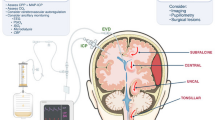Summary
The effects of hyperventilation, osmotic and diuretic agents (urea, frusemide), thiopentone and succinylcholine chloride on the intracranial pressure were studied in neurosurgical patients with brain tumours. We have shown that hyperventilation together with osmotic and diuretic agents is very useful for reducing increased intracranial pressure.
Similar content being viewed by others
References
Lundberg, N., Continuous recording and control of ventricular fluid preasure in neurosurgical practice. Acta psychiat. scand. suppl.149 (1960), 36.
Lundberg, N., Kjallquist, A., Bien, C., Reduction of increased intracranial pressure by hyperventilation. Acta psychiat. scand. suppl.139 (1959), 34.
Javid, M., Urea in intracranial surgery. J. Neurosurg.18 (1961), 51–57.
Author information
Authors and Affiliations
Rights and permissions
About this article
Cite this article
Moszyński, K. Dynamic changes in cerebrospinal fluid pressure during neurosurgical operations. Acta neurochir 34, 285–286 (1976). https://doi.org/10.1007/BF01405886
Issue Date:
DOI: https://doi.org/10.1007/BF01405886




